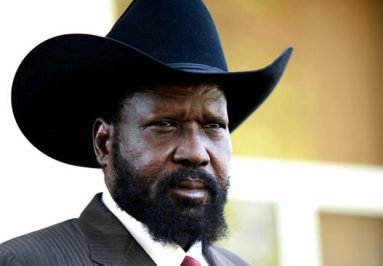Key witness in corruption case at President Kiir’s office speaks out
January 7, 2017 – (JUBA) – One of the key witnesses in the case involving the alleged theft of $14 million and SSP 30 million from the Office of South Sudanese President Salva Kiir, has spoken out during the trial of the 16 accused persons.

Majok, court documents Sudan Tribune obtained shows, told court that he was called by the Director General of the General Intelligence Bureau (GIB), Gen. Thomas Duoth Guet on 28 May 2015 and ordered to arrest 1st Lt. John Agou.
The arrest came in the wake of an alleged intelligence report implicating Agou in the huge transfers of money from the president’s office to his bank account in Nairobi, Kenya in favour of Mayen Wol Jong and Yel Luol Koor.
“On 29/5/2015, I ordered a company of security personnel from GIB under the command of Capt. Gum Bol Noah, Capt. Charles Andrew Churukali and 2nd Lt Adiing Deng to arrest 1st Lt John Agou and other staff of his company and to take them to GIB Headquarters,” Majok told the court.
He further went on to tell the High Court that on 2nd June, 2015, the Director General of GIB General Duoth ordered him in writing through a letter to the Undersecretary of the Ministry of Justice, to institute criminal proceeding against Agou and 11 of his employees who had been arrested together with him during the operations on 29 May 2015.
“On 3/6/2015, I opened case number 2158/2015, Agou and others versus the General Intelligence Bureau (GIB) at Juba High court,” he asserted.
However, during cross examination by defense lawyers on whether he was aware about the case against more other accused persons other than Agou and his company’s staff, Majok told the court that “he did not have a case against some of the people in court, adding that he was unaware of who ordered for their arrest, investigation, detention and prosecution in court”.
The accused persons Gen. Paul referred to as having no case to answer according to court documents are; Susan Anyieth Chaat Paul (John Agou’s wife), Yel Luol Koor, Mayen Wol Jong, Ring Ajing Juk, Nhomuot Agoth Cithiik, Anna Kalisto Ladu, Kur Ayuen Kou, Garang Aguer Akok, Chaat Paul Nul, Anyang Majok Ayuen and Francis Yatta Justin.
But when asked by the judge if the National Security Service was subordinate to civilian authority and the constitution, Majok responded that they were required to work within the country’s constitution which is the Supreme law of the South Sudan.
He was further asked why the National Security Service stormed someone’s business premises without search warrant from the court and if that action is legal and lawfully? He says the searches that were done at Click Technologies Ltd was “illegal and did not follow correct procedures of the law” but he did it because he was “ordered by senior authority” to do so.
He also denied that he personally participated in drafting of the intelligence report that led to Agou’s arrest and did not know the source of that intelligence report. What he know is he was acting on orders from his senior General Thomas Duoth Guet, the Director General of GIB.
According to report released by Legal Watch Associates, the case into the alleged corruption in the president’s office was formally opened, five days after Agou, eleven of his employees and customers had been arrested and detained without charge in violation of constitutional provisions.
In an interview with Sudan Tribune, one of the lawyer who was representing some of the accused persons by then described the case as “politically motivated”.
“We assumed that day the judge was going to free the people denied by the complainant and continue the case against others he mentioned as having opened the case against, if the complainant abdicated his case against an accused, the judge is under obligation to free the accused there and then because it will be considered as having withdrawn the case against that particular person”, said the lawyer.
In the absence of the rule of law in the country, the judge was ordered to sentence them with or without a crime and that is the very reason he passed that severe and uniform blanket convictions,” he added.
The case, currently before the appeal court, places the country’s justice system under scrutiny, calling into question public confidence in the independence of the judiciary. The case involved 16 people from different institutions including the President’s office, Finance Ministry, Bank of South Sudan and four Kenyan nationals who worked for Click Technologies Ltd.
(ST)
